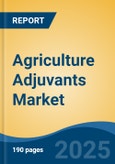Cereals & grains is the fastest growing segment, North America is the largest regional market
Speak directly to the analyst to clarify any post sales queries you may have.
10% Free customizationThis report comes with 10% free customization, enabling you to add data that meets your specific business needs.
Key Market Drivers
The global agriculture adjuvants market is significantly propelled by the increasing demand for enhanced crop protection chemical efficacy. Modern agricultural practices rely on optimizing agrochemical performance, with adjuvants improving the spreading, penetration, and retention of pesticides and fertilizers to maximize effectiveness and reduce waste.This necessity is underscored by the substantial investment in the underlying chemical market; according to Infosys's Agri-chem Industry Outlook, in 2023, the pesticide and other agricultural chemicals market was valued at $102.9 billion. Complementing this, the global imperative to boost food production amidst declining arable land is a fundamental driver. A growing global population places immense pressure on farmers to produce more food from finite resources. Land scarcity and degradation necessitate that agricultural inputs are utilized with maximum efficiency to achieve higher yields per hectare.
Key Market Challenges
The intricate and continually shifting global regulatory environment for agricultural chemicals, coupled with increasing environmental concerns regarding chemical residues, significantly impedes the growth of the global agriculture adjuvants market. Stricter approval processes, heightened requirements for environmental safety data, and the potential for product bans or use restrictions elevate the complexity and cost associated with bringing new adjuvant formulations to market. This regulatory burden necessitates extensive testing and documentation, leading to prolonged development cycles and increased operational expenditures for manufacturers.Key Market Trends
The agriculture adjuvants market is witnessing a notable shift towards bio-based and biodegradable formulations, driven by heightened environmental awareness and evolving regulations. This trend emphasizes developing sustainable alternatives to synthetic chemicals, aiming to minimize ecological impact and reduce residues in food systems. These naturally derived options provide comparable efficacy while meeting the increasing demand for organic and residue-free produce. For example, according to FMC Corporation, in May 2024, the company announced a research agreement with AgroSpheres, following an investment in 2023, to accelerate the development of novel bioinsecticides and biodegradable micro-encapsulation technology for sustainable crop protection solutions. This strategic pivot is crucial for market participants to adhere to environmental standards and satisfy consumer demand for ecologically sound agricultural practices.Key Market Players Profiled:
- Miller Chemical and Fertilizer LLC
- Precision Laboratories, LLC
- CHS Inc.
- Kalo Inc.
- Corteva Inc.
- Evonik Industries AG
- Nufarm Limited
- Croda International Plc.
- Solvay S.A.
- BASF SE
- Huntsman Corporation
Report Scope:
In this report, the Global Agriculture Adjuvants Market has been segmented into the following categories:By Type:
- Utility adjuvants
- Activator adjuvants
By Application:
- Insecticides
- Fungicides
- Herbicides
- Others
By Crop:
- Oilseeds & pulses
- Cereals & grains
- Fruits & vegetables
- Others
By Region:
- North America
- Europe
- Asia-Pacific
- South America
- Middle East & Africa
Competitive Landscape
Company Profiles: Detailed analysis of the major companies present in the Global Agriculture Adjuvants Market.Available Customizations:
With the given market data, the publisher offers customizations according to a company's specific needs. The following customization options are available for the report.Company Information
- Detailed analysis and profiling of additional market players (up to five).
This product will be delivered within 1-3 business days.
Table of Contents
Companies Mentioned
The companies profiled in this Agriculture Adjuvants market report include:- Miller Chemical and Fertilizer LLC
- Precision Laboratories, LLC
- CHS Inc.
- Kalo Inc.
- Corteva Inc.
- Evonik Industries AG
- Nufarm Limited
- Croda International Plc.
- Solvay S.A.
- BASF SE
- Huntsman Corporation
Table Information
| Report Attribute | Details |
|---|---|
| No. of Pages | 190 |
| Published | November 2025 |
| Forecast Period | 2024 - 2030 |
| Estimated Market Value ( USD | $ 3.13 Billion |
| Forecasted Market Value ( USD | $ 4.34 Billion |
| Compound Annual Growth Rate | 5.5% |
| Regions Covered | Global |
| No. of Companies Mentioned | 12 |









